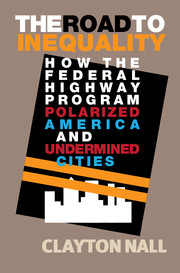Book contents
- Frontmatter
- Dedication
- Contents
- List of Figures
- List of Tables
- Guide to Abbreviations
- Acknowledgements
- 1 Introduction
- 2 How Highways Facilitate Partisan Geographic Sorting
- 3 Highways Polarize Metropolitan Political Geography
- 4 Transportation Becomes a Partisan Issue
- 5 Implications for Transportation Policy Making
- 6 Conclusion
- Bibliography
- Index
5 - Implications for Transportation Policy Making
Published online by Cambridge University Press: 19 March 2018
- Frontmatter
- Dedication
- Contents
- List of Figures
- List of Tables
- Guide to Abbreviations
- Acknowledgements
- 1 Introduction
- 2 How Highways Facilitate Partisan Geographic Sorting
- 3 Highways Polarize Metropolitan Political Geography
- 4 Transportation Becomes a Partisan Issue
- 5 Implications for Transportation Policy Making
- 6 Conclusion
- Bibliography
- Index
Summary
Previous chapters showed that highways have facilitated the urban– suburban sorting of American partisans across the postwar period. In the years since construction of the Interstate Highway System, the Republican Party has become increasingly suburban and rural. While Democrats have also suburbanized over the same period, they dominate central cities. I have shown that this likely has a substantial effect on how members of the two parties view transportation policy. Democrats and Republicans in the electorate are increasingly divided over policies that previously elicited bipartisan agreement. Whether this change has been due to conservatives and liberals geographically sorting, or a result of increasingly nonurban Republicans identifying their personal interests in the suburbs, attitudes on these issues are now tied to partisanship.
Do these changes matter to public policy? If American partisans are extending their coherent ideological views to transportation policy, we might expect them to influence institutions, from Congress to regional transportation planning organizations, that decide transportation policy. In this chapter, I examine the consequences of partisan geographic sorting for transportation policy. If, as Chapter 4 suggests, Democrats and Republicans increasingly disagree over transportation policy, and split along urban–suburban lines, under what circumstances will this lead to policies that worsen spatial inequality?
While this chapter is far more exploratory than previous chapters, the results here collectively demonstrate the importance of partisan geographic polarization in the setting of transportation policy. The findings in this chapter suggest that partisan geographic polarization has mattered to transportation policy more in a local than in a national context. The mere presence of partisan geographic polarization and growing partisan attitudinal differences does not imply that policy conflict will increase across geographic levels.
At the federal level, the urban–suburban divide has seemed to have little effect on longstanding transportation institutions, including the politically robust programs that fund highways and transit. Even as urban Republicans have vanished from Congress and conservative Republicans have introduced bills to cut federal mass transit funding – moves that reflect the general polarization of the two party caucuses – the transportation policy status quo has remained remarkably robust. Status quo bias and strong norms of universalism around transportation legislation (Panagopoulos and Schank, 2007), combined with a paucity of member bills on transportation issues, suggest that growing urban–suburban polarization has done little to change federal transportation policies.
- Type
- Chapter
- Information
- The Road to InequalityHow the Federal Highway Program Polarized America and Undermined Cities, pp. 107 - 134Publisher: Cambridge University PressPrint publication year: 2018



